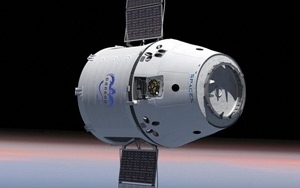 Google could be close to investing in a project that would support Internet access from space via satellite. The $1 billion infusion would value Space Exploration Technologies Corp.,
better known as rocket developer SpaceX, at about $10 billion. It would give Google the tools to offer Internet access from virtually anywhere.
Google could be close to investing in a project that would support Internet access from space via satellite. The $1 billion infusion would value Space Exploration Technologies Corp.,
better known as rocket developer SpaceX, at about $10 billion. It would give Google the tools to offer Internet access from virtually anywhere.
The investment would bolster both companies'
plans for providing low-cost Internet access to underserved regions of the globe. Providing some people with the ability to search for information doesn't seem to satisfy Google, so it appears the
Mountain View, Calif. company will look to invest in projects that extend far into the vast open universe.
Extending Internet access via satellite would enable Google to increase the number of
people who could use its services. Sending satellites into orbit via rockets or spaceships follows similar moves by NASA and government space contractors like Boeing.
advertisement
advertisement
SpaceX CEO Elon
Musk last week described how the company could launch hundreds of satellites into relatively low orbit to deliver Internet access across the globe. He told Bloomberg BusinessWeek that the project could cost $10 billion and take at least five years to
build.
"The Space Internet venture, to which Musk hasn’t yet given a name, would be hugely ambitious," per Bloomberg. "Hundreds of satellites would orbit about 750 miles above
earth, much closer than traditional communications satellites in geosynchronous orbit at altitudes of up to 22,000 miles. The lower satellites would make for a speedier Internet service, with less
distance for electromagnetic signals to travel."
At one point, reports said Facebook wanted to acquire Titan Aerospace, the maker of a solar-powered high-altitude drone, but Google stepped in
and acquired the New Mexico-based startup last April for an
undisclosed sum. Then in August, Google approved a drone project with a prototype dubbed Project Wing.
In Google's X division, reports suggest Titan's 20-person team is working closely with
those on Project Loon, an initiative aimed at delivering access to the Internet via air balloon. Unveiled in 2013, the solar-powered balloons are remote controlled, and can navigate far higher
than most planes travel. The balloons can communicate with special antennas and receiver stations on the ground.